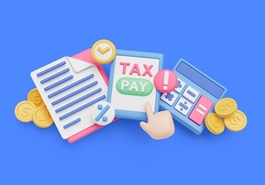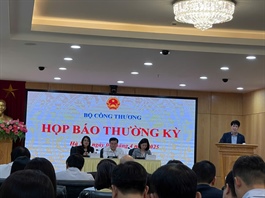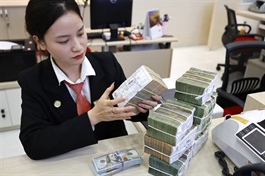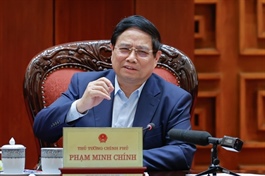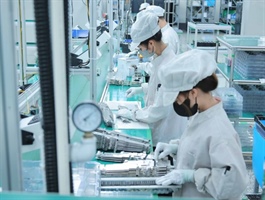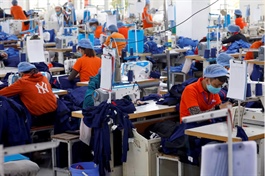What’s experts’ take on US tariff on Vietnam?
What’s experts’ take on US tariff on Vietnam?
Washington’s reciprocal 46-percent tariff on imports from Vietnam has sent shockwaves through the market. However, international observers in Vietnam believe businesses are likely to remain calm – at least for now.

A cargo ship is seen from Tan Vu Port in Hai Phong near Hanoi, August 29, 2023. Photo: AFP |
Some analysts view the newly announced tariff more as a strategic signal aimed at prompting serious negotiations.
They say it is unlikely that foreign-invested firms in Vietnam will take any drastic steps immediately.
Strategic patience
“Most firms will wait to see how the situation evolves before making any major moves,” said independent policy and economy advisor Rich McClellan.
According to McClellan, the first reaction will likely be strategic patience. Many companies will push for exemptions, clarifications, or diplomatic interventions.
Before the U.S universal reciprocal tariffs were announced on Thursday, the Vietnamese government had already taken steps to mitigate the risks.
From March 31, Vietnam slashed import duties on a wide range of goods, including automobiles, liquefied natural gas, ethanol, frozen chicken legs, pistachios, almonds, fresh apples, cherries, and raisins.
The Vietnamese government also approved a trial run for SpaceX’s Starlink satellite Internet services.
In the wake of the U.S. administration’s announcement of the reciprocal tariff, Deputy Prime Minister Ho Duc Phoc is set to depart for a business trip to the U.S. on Sunday.
That is to say Vietnam has prepared for the tariff’s scenarios, signaling that it is ready for deals.
The acts help reassure firms that Vietnam will negotiate and they can ‘wait.’
Otherwise, the expensive costs for shifting production from Vietnam serve as another key factor to consider before making any decision.
Agreeing that the steep tariff should be seen as the opening salvo in what could become a prolonged negotiation, Dr. Jonathan R. Pincus, dean of the Fulbright School of Public Policy and Management at Fulbright University Vietnam, noted that companies are likely to adopt a wait-and-see approach.
“There will not be an immediate shift away from Vietnam,” said Dr. Pincus.
“It is very costly to dismantle and reconstruct supply chains, and these costs must be factored into decisions.”
However, he pointed out that the tariff, effective on April 9, will have a chilling effect on new investments, as companies reassess its impact on the viability of proposed projects in Vietnam.
Given that most of the goods Vietnam exports to the U.S. are no longer produced domestically in America, labor-intensive manufacturing is unlikely to return stateside, despite Washington’s push.
For Vietnamese shipments, the key question now is how their production costs stack up against those in other low-wage economies.
“Bangladesh, Cambodia, Indonesia, and Thailand were hit with high tariffs,” said Dr. Pincus.
“Countries receiving slightly better treatment include the Philippines and Mexico.
“But this is just the opening salvo.
“Companies will not react in the short term in a rapidly evolving situation.”
Redirecting in parallel with negotiation
Adding to the point, Partner Vlad Savin at Acclime Vietnam emphasized that Vietnam’s established infrastructure, skilled labor force, and existing trade agreements would play a key role encouraging some companies to stay, while the country and the Trump administration negotiate for tariff reductions.
Regarding a more proactive approach, Savin expected domestic manufacturers to likely pivot toward alternative markets to offload excess inventory and maintain production levels, taking advantage of existing free trade deals.
As of October 2024, Vietnam has signed and implemented 17 such accords.
The Southeast Asian country is currently negotiating two more, including the Comprehensive and Progressive Agreement for Trans-Pacific Partnership and the Regional Comprehensive Economic Partnership.
Therefore, access to markets such as Japan, Canada, Australia, and other ASEAN countries will be supported with lower or free tariffs.
Additionally, domestic firms may accelerate efforts to tap into Vietnam’s growing consumer market, as rising incomes create demand for locally produced goods.
Redirecting the export flows is a necessary measure, but keeping the U.S on the table remains the most priority.
For economic advisor McClellan, Vietnam can no longer afford to take a passive stance.
He emphasized that now is the time for proactive diplomacy, clear communication, and agile policymaking.
Echoing that sentiment, Dr. Pincus recommended a flexible strategy, urging Vietnam to negotiate on a case-by-case basis wherever possible while also preparing viable alternatives.
“This is a challenge for Vietnam but one that the country can meet,” he stated.
- 17:44 06/04/2025









